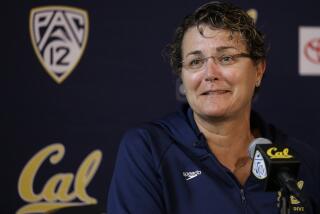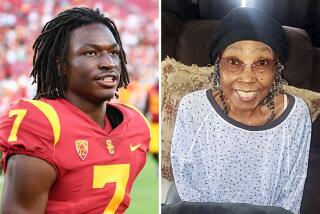Peter Daland dies at 93; coach of swimming champions at USC, Olympics
Peter Daland, who started his career at USC as a part-time swim coach with a desk in a mimeograph room and rose to become one of the most celebrated names in both collegiate and Olympic swimming, died Monday in Thousand Oaks. He was 93.
Daland had Alzheimer’s disease, USC said.
Daland coached the 1972 U.S. Olympic men’s swim team to nine gold medals, including the seven won by Mark Spitz. Eight years earlier, he guided the U.S. women’s team to six gold medals.
At USC, where he coached from 1958 until his retirement in 1992, Daland’s teams won nine NCAA championships and placed second 11 times. At AAU meets, they finished first or second a total of 20 times during his 35-year tenure. In all, he coached 70 Olympians and 392 All-Americans.
A former assistant coach at Yale, Daland brought the bearing of an upper-crust Eastern sophisticate to the ancient USC pool informally known as “the dungeon.” He often wore a necktie and dress slacks on the pool deck and insisted that his swimmers call him “Mr. Daland.” As for the traditional dunking of the swim coach after winning a championship meet, Daland never had to explain his uncompromising position: Thank you, but no thanks.
“I wasn’t their buddy,” Daland told the Ventura County Star in 2011. “I was their friend, but not their buddy.”
Daland, who received national coach of the year honors six times, was “like a Victorian father,” said John Naber, a USC standout who won four gold medals at the Montreal Olympics in 1976. “He was like the banker in ‘Mary Poppins’ before he flies the kite.”
Daland wouldn’t hesitate to correct his swimmers’ speech if they made grammatical errors. At a team recruitment event, a mischievous Trojan quietly placed an Oreo cookie on the shoulder pad of Daland’s sports jacket. The coach, knowing it was there, blithely went about his meet-and-greets.
“The amazing thing is, he refused to acknowledge it,” Naber said. “He wouldn’t dignify it by brushing it off.”
Daland was similarly single-minded about improving his swimmers’ performance. His knowledge of the competition’s strengths and weaknesses was encyclopedic, and he used it to motivate his team.
Ten days before a meet against top-ranked Stanford, Daland distributed precise predictions of every swimmer’s upcoming time. If everything went according to plan, USC would win — and everything did, until the final turn in the final event, when a stroke by USC swimmer Robert Pufleb suddenly “fell apart.”
“You could see the wheels turning,” Daland said at a 1992 USC swimming banquet. “Pufleb knew he had to win, for us to win the meet — and with this nightmare of a stroke, he went into a wild sprint … and won the race.”
At the Munich Olympics in 1972, Daland coached the U.S. team that included Mark Spitz, whose record of seven gold medals stood for 36 years until Michael Phelps took home eight from the 2008 Summer Games in Beijing.
“With Peter, you knew exactly when to get up, when to work out, how to work out — he left no room for error,” Spitz said in an interview Monday. “And he was spot-on correct.”
Born on April 12, 1921, in New York City, Daland grew up in Philadelphia. Like his father and grandfather, he went to Harvard and then joined the Army after two years. After World War II, he resumed his studies at Swarthmore College in Pennsylvania.
Daland, who swam at Swarthmore, signed on as assistant coach at Yale from 1950 to 1954. To his father’s chagrin, he was smitten with coaching as a career.
“He was a guy that didn’t like organized sport, but it was none of his damn business,” Daland told The Times in 2011. “What happened was I just made a decision that I would never discuss my career with my father. I never did, and we got along wonderfully.”
Daland was convinced that swimming’s future lay in California.
“Western parents weren’t like Eastern parents, who were interested in the development of well-rounded children, not champions,” he told a Times reporter in 1976. “The attitude in the West toward swimming was much more fanatic. Parents would let their children achieve excellence in something, rather than mediocrity in everything.”
After a long job search, Daland was hired part time at the Los Angeles Athletic Club and then at USC.
In 2012, one of his former swimmers, Fred Uytsengsu, gave the university $8 million for an aquatics center. The pool is named for Daland.
Daland’s survivors include Ingrid, his wife of nearly 50 years; sons George, Roger and Peter Jr.; daughters Bonnie and Leslie; and eight grandchildren.
Ingrid Daland founded a swim club in Thousand Oaks, where her husband also taught. Their daughter Leslie won the 800-meter freestyle at the 1986 Goodwill Games in Moscow.
Afterward, Daland frequently said that draping a gold medal around her neck was the high point of his career.
Twitter: @schawkins
More to Read
Start your day right
Sign up for Essential California for the L.A. Times biggest news, features and recommendations in your inbox six days a week.
You may occasionally receive promotional content from the Los Angeles Times.







